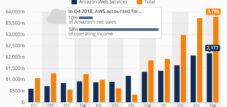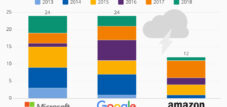Top ten data management systems (DMS) - from Document Management Systems to Cloud Database Management (DBMS)
Xpert pre-release
Language selection 📢
Published on: April 13, 2025 / update from: April 13, 2025 - Author: Konrad Wolfenstein

Top ten data management systems (DMS) - From Document Management Systems to Cloud Database Management (DBMS) - Image: Xpert.digital
Understand data management systems: The key to digital transformation
The landscape of data management systems: a comprehensive overview
In today's data -driven world, effective data management is no longer just an option, but an absolute necessity for companies of all sizes and industry. The ability to collect, store, process, analyze and use data significantly decides on competitiveness, innovative strength and ultimately the success of a company. In view of the rapidly growing amounts of data, the increasing complexity of data sources and the steadily increasing requirements for data quality, security and compliance, the selection of the correct data management system (DMS) becomes a strategic decision of far -reaching importance.
However, identifying the “TOP 10” data management systems is not an easy task. The market is dynamic, fragmented and shaped by a large number of providers, technologies and solutions. The boundaries between the different categories of DMS are increasingly blurred, since providers continuously develop and expand their platforms with new functions and integrations.
In order to be able to make a well-founded selection, it is therefore essential to develop a deep understanding of the various DMS categories, their respective strengths and weaknesses as well as the specific requirements of your own company.
Suitable for:
- The ability to use technologies efficiently is just as crucial as their development, it is often said in the discussion
The variety of data management categories
The term “data management system” is a collective term that includes a wide range of technologies and solutions. In order to reduce the complexity of the market, it is helpful to distinguish the different categories of DMS:
Master Data Management (MDM)
MDM systems focus on the management and consolidation of master data. Master data is the core data of a company that are of crucial importance for business operations. This includes, for example, customer data, product data, supplier data, employee data and financial data. The aim of MDM is to create a central, consistent and reliable source of master data that can be used by all relevant applications and business processes. An effective MDM strategy helps to improve data quality, reduce redundancies, meet compliance requirements and make well-founded decisions.
Customer Data Platforms (CDP)
CDPs are designed to collect, standardize and activate customer data from various sources. In contrast to traditional CRM systems that primarily focus on transaction data, CDPs also record behavior data, demographic data, social media data and other relevant information in order to create a comprehensive image of the customer. CDPs enable companies to carry out personalized marketing campaigns, improve customer experience, optimize customer service and strengthen customer loyalty. The integration of AI functions in CDPS enables customer needs to be better understood, predicting future behavior and performing automated marketing campaigns.
Analytics & Business Intelligence (BI)
BI systems are used for analysis and visualization of data to gain knowledge and make well-founded decisions. They enable companies to extract, transform, load, load (ETL) and to store them in a data warehouse or data. BI tools offer a variety of data analysis functions, such as reporting, dashboarding, data mining, predictive analytics and machine learning. By visualizing data in the form of diagrams, graphics and maps, companies can recognize trends, uncover patterns, identify problems and use opportunities.
Cloud Database Management Systems (DBMS)
Cloud-based database management systems offer flexible, scalable and cost-effective way of storing and manage data in the cloud. They essentially offer the same functions as traditional on-premise databases, but with the advantage that they are accessible from anywhere and do not require their own hardware or infrastructure. Cloud DBMS are particularly suitable for companies that have to process large amounts of data, grow quickly or need flexible IT resources. They support a variety of data models, including relational databases, NOSQL databases and data warehouses.
Document Management Systems (DMS) / Enterprise Content Management (ECM)
DMS/ECM systems serve to manage documents and content in a company. They make it possible to create, store, organize, search, versions, approved and archive them. DMS/ECM systems support a variety of document formats, including text documents, spreadsheets, presentations, images, videos and audio recordings. They offer functions for workflow automation, collaboration and compliance. DMS/ECM systems are particularly important for companies that have to process large quantities of documents, have to meet compliance requirements or want to improve cooperation between employees.
🎯📊 Integration of an independent and cross-data source-wide AI platform 🤖🌐 for all company matters

Integration of an independent and cross-data source-wide AI platform for all company matters-Image: Xpert.digital
Ki-Gamechanger: The most flexible AI platform-tailor-made solutions that reduce costs, improve their decisions and increase efficiency
Independent AI platform: Integrates all relevant company data sources
- This AI platform interacts with all specific data sources
- From SAP, Microsoft, Jira, Confluence, Salesforce, Zoom, Dropbox and many other data management systems
- Fast AI integration: tailor-made AI solutions for companies in hours or days instead of months
- Flexible infrastructure: cloud-based or hosting in your own data center (Germany, Europe, free choice of location)
- Highest data security: Use in law firms is the safe evidence
- Use across a wide variety of company data sources
- Choice of your own or various AI models (DE, EU, USA, CN)
Challenges that our AI platform solves
- A lack of accuracy of conventional AI solutions
- Data protection and secure management of sensitive data
- High costs and complexity of individual AI development
- Lack of qualified AI
- Integration of AI into existing IT systems
More about it here:
Comparison of leading data management providers: Focus on solutions for companies
The top ten of data management systems: an overview
The following list represents a selection of leading data management solutions available on the global market. It is important to note that this list is not exhaustive and that the best choice for a specific company depends on its individual requirements and priorities.
1. Informatica (Intelligent Data Management Cloud)
Informatica is an established provider of data management solutions with a wide portfolio that includes MDM, data integration, data quality, data government and cloud data management. The Intelligent Data Management Cloud (IDMC) is a comprehensive platform that is based on artificial intelligence (AI) and supports companies in effectively managing, protecting and using their data. Informatica is characterized by its extensive functions, its high scalability and its ability to manage complex data landscapes. The AI-controlled functions help to improve data accuracy and consistency, to speed up data integration and to simplify data government. Users report significant improvements in data quality and faster added value from their data.
2. Microsoft (Azure Data Factory / Power Bi / SharePoint / SQL Server)
Microsoft offers a wide range of data management solutions as part of its Azure Cloud platform. Azure Data Factory is a cloud -based service for data integration and orchestration, which enables companies to extract, transform and load data from various sources. Power BI is a leading Business Intelligence (BI) platform that enables users to analyze data, visualize and create interactive dashboards. SharePoint is a platform for collaboration and document management, which enables companies to store, organize and share documents together. SQL Server is a relational database management system (RDBMS) that is available both on-premise and in the cloud. Microsoft's strength lies in the deep integration of its products and services within the Azure ecosystem, which enables companies to obtain comprehensive data management solution from a single source.
3. SAP (Master Data Governance / Data Services / BusinessBjects BI / HANA Cloud)
SAP is a leading provider of corporate software that also offers a number of data management solutions. SAP Master Data Governance (MDG) is a solution to the central management of master data. SAP Data Services is a platform for data integration and transformation. SAP Businessobjects BI is a Suite of Business Intelligence (BI) tools that enables users to analyze data, visualize and create reports. SAP HANA Cloud is an in-memory database that is optimized for processing large amounts of data in real time. The strength of SAP lies in its deep integration with other SAP products, especially with SAP ERP and S/4HANA, which enables companies to seamlessly integrate their data management processes into their business processes.
4. Salesforce (Data Cloud / Tableau)
Salesforce is a leading provider of Customer Relationship Management (CRM) software that has expanded its portfolio with data management solutions. Salesforce Data Cloud (formerly Customer 360) is a customer data platform (CDP) that enables companies to collect, standardize and activate customer data from various sources. Tableau is a leading Business Intelligence (BI) platform that enables users to visualize data and create interactive dashboards. The strength of Salesforce focuses on improving customer interaction and personalizing the customer experience. The integration of AI functions into the Data Cloud enables companies to better understand customer needs and carry out personalized marketing campaigns.
5. Oracle (Data Management Suite / Autonomous Database)
Oracle offers a comprehensive suite of data management solutions that include data integration, data quality, MDM and database management. The Oracle Autonomous Database is a cloud-based database that manages, secures itself and repairs itself, which reduces the administrative effort and improves security. Oracle's cloud solutions offer flexibility and scalability and enable companies to adapt their data management infrastructure to their changing needs. Oracle is considered a comprehensive platform provider with a wide range of functions and a strong presence in the enterprise segment.
6. IBM (Infosphere MDM / DB2 / Watson)
IBM offers a comprehensive suite of data management solutions that include data integration, data quality, data governance and MDM. Infosphere MDM is a solution to the central administration of master data. DB2 is a relational database management system (RDBMS) that is available both on-premise and in the cloud. Watson is a AI platform that enables companies to integrate AI functions into their data management processes. The strength of IBM lies in its strong analysis skills and integration with other IBM products and the AI platform Watson.
7. Snowflake
Snowflake is a cloud native data platform that is optimized for high performance and scalability. It supports data integration, data warehousing and analysis. Snowflake's unique architecture separates storage and computing power, which enables companies to optimize costs and improve performance. Snowflake is often used as the basis for modern, “composable” CDP architectures. The platform is characterized by its user -friendliness, its flexibility and its ability to efficiently process large amounts of data.
8. Semarchy (XDM)
Semarchy is a provider of MDM solutions that specializes in data integration and MDM with a uniform platform. The Semarchy's XDM platform enables companies to efficiently manage their master data and create a single source of truth. Semarchy has made a name for itself through its innovative architecture, its user-friendliness and its ability to solve complex data management challenges.
9. Stibo Systems (MDM)
Stibo Systems is an established provider of MDM solutions that supports companies in creating data transparency and drawing strategic value from their master data. Stibo Systems' solutions form the backbone for companies that want to use their master data as a competitive advantage. The extensive functions, its industry expertise and its ability to successfully implement complex MDM projects is characterized by its extensive functions.
10. Enaio
Enaio is a German provider of DMS/ECM systems that focuses on the German market. Enaio offers a modular ECM solution for document management, import, indexing and revision-proof storage. The solution is suitable for various company sizes and specific industries such as pharmaceutical or medicine. Enaio is characterized by its user -friendliness, its flexibility and its ability to meet the specific requirements of the German market.
Suitable for:
- US policy inspires EU tech companies? Data sovereignty of US dominance: The future of the cloud in Europe
Choosing the right DMS
The selection of the correct data management system is a complex decision that requires careful consideration. Companies should carefully analyze their individual requirements and priorities and compare the various DMS categories and providers to find the solution that best suits their needs. It is advisable to carry out comprehensive evaluation, obtain references and carry out pilot projects to ensure that the selected solution delivers the expected results.
In today's data -driven world, effective data management is essential for the success of a company. The investment in the right data management system is an investment in the future.
We are there for you - advice - planning - implementation - project management
☑️ SME support in strategy, consulting, planning and implementation
☑️ Creation or realignment of the AI strategy
☑️ Pioneer Business Development
I would be happy to serve as your personal advisor.
You can contact me by filling out the contact form below or simply call me on +49 89 89 674 804 (Munich) .
I'm looking forward to our joint project.
Xpert.Digital - Konrad Wolfenstein
Xpert.Digital is a hub for industry with a focus on digitalization, mechanical engineering, logistics/intralogistics and photovoltaics.
With our 360° business development solution, we support well-known companies from new business to after sales.
Market intelligence, smarketing, marketing automation, content development, PR, mail campaigns, personalized social media and lead nurturing are part of our digital tools.
You can find out more at: www.xpert.digital - www.xpert.solar - www.xpert.plus


























